【美国总统电台演说】2011-06-04
美国总统周末电台演讲
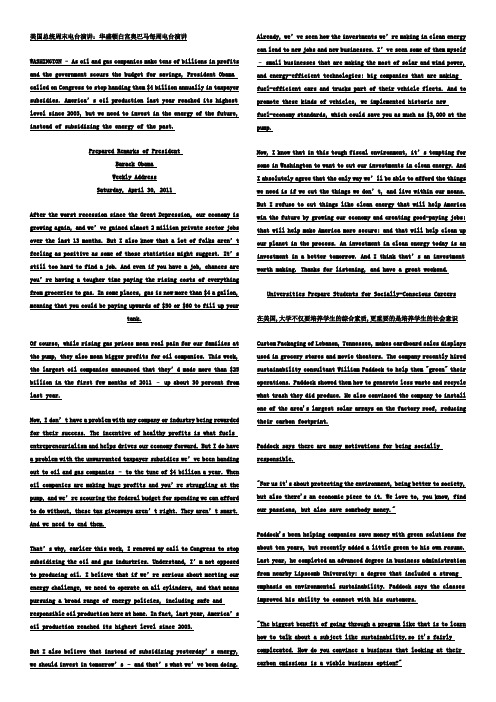
美国总统周末电台演讲:华盛顿白宫奥巴马每周电台演讲WASHINGTON –As oil and gas companies make tens of billions in profits and the government scours the budget for savings, President Obama called on Congress to stop handing them $4 billion annually in taxpayer subsidies. America’s oil production last year reached its highest level since 2003, but we need to invest in the energy of the future, instead of subsidizing the energy of the past.Prepared Remarks of PresidentBarack ObamaWeekly AddressSaturday, April 30, 2011After the worst recession since the Great Depression, our economy is growing again, and we’ve gained almost 2 million private sector jobs over the last 13 months. But I also know that a lot of folks aren’t feeling as positive as some of those statistics might suggest. It’s still too hard to find a job. And even if you have a job, chances are you’re having a tougher time paying the rising costs of everything from groceries to gas. In some places, gas is now more than $4 a gallon, meaning that you could be paying upwards of $50 or $60 to fill up yourtank.Of course, while rising gas prices mean real pain for our families at the pump, they also mean bigger profits for oil companies. This week, the large st oil companies announced that they’d made more than $25 billion in the first few months of 2011 – up about 30 percent from last year.Now, I don’t have a problem with any company or industry being rewarded for their success. The incentive of healthy profits is what fuels entrepreneurialism and helps drives our economy forward. But I do have a problem with the unwarranted taxpayer subsidies we’ve been handing out to oil and gas companies – to the tune of $4 billion a year. When oil companies are making hug e profits and you’re struggling at the pump, and we’re scouring the federal budget for spending we can afford to do without, these tax giveaways aren’t right. They aren’t smart. And we need to end them.That’s why, earlier this week, I renewed my call to C ongress to stop subsidizing the oil and gas industries. Understand, I’m not opposed to producing oil. I believe that if we’re serious about meeting our energy challenge, we need to operate on all cylinders, and that means pursuing a broad range of energy policies, including safe and responsible oil production here at home. In fact, last year, America’s oil production reached its highest level since 2003.But I also believe that instead of subsidizing yesterday’s energy, we should invest in tomorrow’s –and that’s what we’ve been doing. Already, we’ve seen how the investments we’re making in clean energy can lead to new jobs and new businesses. I’ve seen some of them myself – small businesses that are making the most of solar and wind power, and energy-efficient technologies; big companies that are making fuel-efficient cars and trucks part of their vehicle fleets. And to promote these kinds of vehicles, we implemented historic newfuel-economy standards, which could save you as much as $3,000 at the pump.Now, I know that in this tough fiscal environment, it’s tempting for some in Washington to want to cut our investments in clean energy. And I absolutely agree that the only way we’ll be able to afford the things we need is if we cut the things we don’t, and l ive within our means. But I refuse to cut things like clean energy that will help America win the future by growing our economy and creating good-paying jobs; that will help make America more secure; and that will help clean up our planet in the process. An investment in clean energy today is an investment in a better tomorrow. And I think that’s an investment worth making. Thanks for listening, and have a great weekend.Universities Prepare Students for Socially-Conscious Careers在美国,大学不仅要培养学生的综合素质,更重要的是培养学生的社会意识Custom Packaging of Lebanon, Tennessee, makes cardboard sales displays used in grocery stores and movie theaters. The company recently hired sustainability consultant William Paddock to help them "green" their operations. Paddock showed them how to generate less waste and recycle what trash they did produce. He also convinced the company to install one of the area's largest solar arrays on the factory roof, reducing their carbon footprint.Paddock says there are many motivations for being socially responsible."For us it's about protecting the environment, being better to society, but also there's an economic piece to it. We love to, you know, find our passions, but also save somebody money."Paddock's been helping companies save money with green solutions for about ten years, but recently added a little green to his own resume. Last year, he completed an advanced degree in business administration from nearby Lipscomb University; a degree that included a strong emphasis on environmental sustainability. Paddock says the classes improved his ability to connect with his customers."The biggest benefit of going through a program like that is to learn how to talk about a subject like sustainability,so it's fairly complecated. How do you convince a business that looking at their carbon emissions is a viable business option?"Belmont University, in Nashville, takes a different approach for those interested in a for-benefit career. These students will be among the first to graduate with the university's new bachelor's degree in Social Entrepreneurship. Today, they are arranging senior internships with local charities.Bernard Turner, director of Belmont's Center for Social Entrepreneurship, says American universities were slow to offer degrees in for-benefit fields of study, and are now being forced to quickly add those programs."Students are saying, 'Now, listen, I want to be an entrepreneur, but I want to do something that deals with a social problem or a social issue that's dear to me.' So what has happened is that a lot of these programs have come to fruition because they are student-driven; student desires about this."Students are driven by very personal motivations."We've even had students that said, you know, 'Alcoholism was an issue in my family. So how can I study social entrepreneurship and do something about giving these folks a second chance when they come out of treatment?'"Andrew Bishop is one of the program's star students. He launched his first charity when he was still in high school. Turner is helping him launch a second charity that connects professors with opportunities to volunteer in the community.Bishop says he and his peers are motivated by what they see in the media."Even 20 years ago, you really only knew what was going on in your community. But now, you have more of this world and worldwide sense of what's going on and I think it's challenged young people as they're growing up to kind of look at 'How can I make a difference and how can I solve some of these world issues with what I do with my career?'"That growing desire to make a difference and a living at the same time, is why Bishop says American universities are likely to continue expanding their degree offerings in socially-centered areas of study."I think more people want to be able to say that when they retire, 'I did make a difference in my work, and I did make a difference in the life of someone else through what I did each and every day.'"From just a handful of offerings 20 years ago, there are now more than 60 American universities offering "green" business degrees alone.第2课:dit ch和t o hit the spot今天李华和Micha el在对话里使用的两个常用语,一个是:to ditch,另一个是:t o hit t he spot。
美国总统电台讲话
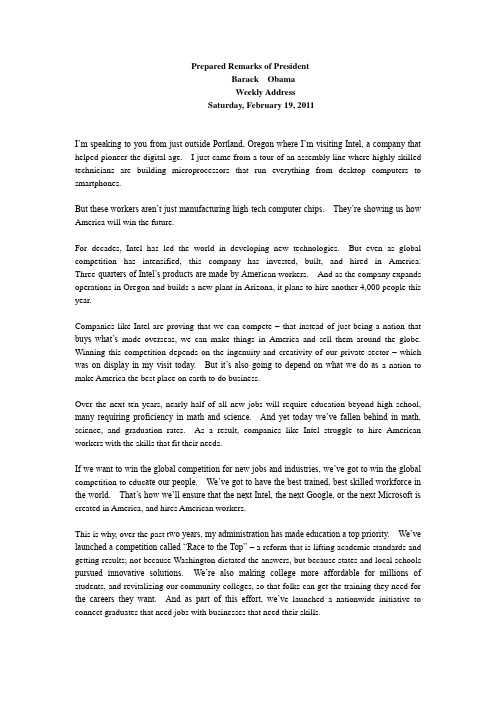
Prepared Remarks of PresidentBarack ObamaWeekly AddressSaturday, February 19, 2011I’m speaking to you from just outside Portland, Oregon where I’m visiting Intel, a company that helped pioneer the digital age. I just came from a tour of an assembly line where highly-skilled technicians are building microprocessors that run everything from desktop computers to smartphones.But these workers aren’t just manufacturing high-tech computer chips. They’re showing us how America will win the future.For decades, Intel has led the world in developing new technologies. But even as global competition has intensified, this company has invested, built, and hired in America. Three-quarters of Intel’s products are made by Amer ican workers. And as the company expands operations in Oregon and builds a new plant in Arizona, it plans to hire another 4,000 people this year.Companies like Intel are proving that we can compete – that instead of just being a nation that buys what’s made overseas, we can make things in America and sell them around the globe. Winning this competition depends on the ingenuity and creativity of our private sector – which was on display in my visit today. But it’s also going to depend on what we do as a nation to make America the best place on earth to do business.Over the next ten years, nearly half of all new jobs will require education beyond high school, many requiring proficiency in math and science. And yet today we’ve fallen behind in math, science, and graduation rates. As a result, companies like Intel struggle to hire American workers with the skills that fit their needs.If we want to win the global competition for new jobs and industries, we’ve got to win the global competition to educ ate our people. We’ve got to have the best trained, best skilled workforce in the world. That’s how we’ll ensure that the next Intel, the next Google, or the next Microsoft is created in America, and hires American workers.This is why, over the past t wo years, my administration has made education a top priority. We’ve launched a competition called “Race to the Top” – a reform that is lifting academic standards and getting results; not because Washington dictated the answers, but because states and local schools pursued innovative solutions. We’re also making college more affordable for millions of students, and revitalizing our community colleges, so that folks can get the training they need for the careers they want. And as part of this effort, we’v e launched a nationwide initiative to connect graduates that need jobs with businesses that need their skills.Intel understands how important these partnerships can be –recognizing that their company’s success depends on a pipeline of skilled people ready to fill high-wage, high-tech jobs. Intel often pays for workers to continue their education at nearby Portland State University. As a result, one out of every fifteen of Intel’s Oregon employees has a degree from Portland State.In fact, Intel’s co mmitment to education begins at an even younger age. The company is providing training to help 100,000 math and science teachers improve their skills in the classroom. And today, I’m also meeting a few students from Oregon who impressed the judges in the high school science and engineering competitions that Intel sponsors across America.One young woman, Laurie Rumker, conducted a chemistry experiment to investigate ways to protect our water from pollution. Another student, named Yushi Wang, applied the principles of quantum physics to design a faster computer chip. We’re talking about high school students.So these have been a tough few years for our country. And in tough times, it’s natural to question what the future holds. But when you meet you ng people like Laurie and Y ushi, it’s hard not to be inspired. And it’s impossible not to be confident about America.We are poised to lead in this new century –and not just because of the good work that large companies like Intel are doing. All across America, there are innovators and entrepreneurs who are trying to start the next Intel, or just get a small business of their own off the ground. I’ll be meeting with some of these men and women next week in Cleveland, to get ideas about what we can do to help their companies grow and create jobs.The truth is, we have everything we need to compete: bold entrepreneurs, bright new ideas, and world-class colleges and universities. And, most of all, we have young people just brimming with promise and ready to help us succeed. All we have to do is tap that potential.That’s the lesson on display at Intel. And that’s how America will win the future.Thank you.。
【美国总统电台演说】2011-04-09
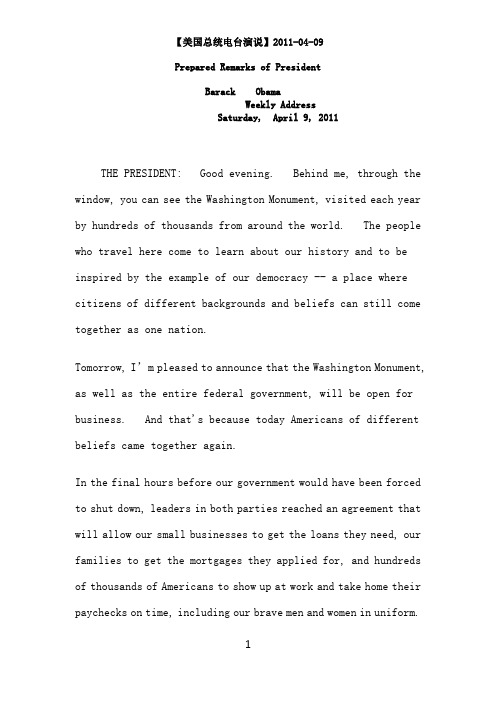
Prepared Remarks of PresidentBarack ObamaWeekly AddressSaturday, April 9, 2011THE PRESIDENT: Good evening. Behind me, through the window, you can see the Washington Monument, visited each year by hundreds of thousands from around the world. The people who travel here come to learn about our history and to be inspired by the example of our democracy -- a place where citizens of different backgrounds and beliefs can still come together as one nation.Tomorrow, I’m pleased to ann ounce that the Washington Monument, as well as the entire federal government, will be open for business. And that's because today Americans of different beliefs came together again.In the final hours before our government would have been forced to shut down, leaders in both parties reached an agreement that will allow our small businesses to get the loans they need, our families to get the mortgages they applied for, and hundreds of thousands of Americans to show up at work and take home their paychecks on time, including our brave men and women in uniform.This agreement between Democrats and Republicans, on behalf of all Americans, is on a budget that invests in our future while making the largest annual spending cut in our history. Like any worthwhile compromise, both sides had to make tough decisions and give ground on issues that were important to them. And I certainly did that.Some of the cuts we agreed to will be painful. Programs people rely on will be cut back. Needed infrastructure projects will be delayed. And I would not have made these cuts in better circumstances.But beginning to live within our means is the only way to protect those investments that will help America compete for new jobs -- investments in our kids’ education and student loans; in clean energy and life-saving medical research. We protected the investments we need to win the future.At the same time, we also made sure that at the end of the day, this was a debate about spending cuts, not social issues like women’s health and the protection of our air and water. These are important issues that deserve discussion, just not during a debate about our budget.I want to think Speaker Boehner and Senator Reid for their leadership and their dedication during this process. A few months ago, I was able to sign a tax cut for American families because both parties worked through their differences and found common ground. Now the same cooperation will make possible the biggest annual spending cut in history, and it’s my sincere hope that we can continue to come together as we face the many difficult challenges that lie ahead, from creating jobs and growing our economy to educating our children and reducing our deficit. That's what the American people expect us todo. That's why they sent us here.A few days ago, I received a letter from a mother in Longmont, Colorado. Over the year, her son’s eighth grade class saved up money and worked on projects so that next week they could take a class trip to Washington, D.C. They even have an appointment to lay a wreath on the Tomb of the Unknown Soldier. The mother wrote that for the last few days the kids in her son’s class had been worried and upset that they might have to cancel their trip because of a shutdown. She asked those of us in Washington to get past our petty grievances and makethings right. And she said, “Remember, the future of this country is not for us. It’s for our children.”Today we acted on behalf of our children’s future. And next week, when 50 eighth graders from Colorado arrive in our nation’s capital, I hope they get a chance to look up at the Washington Monument and feel the sense of pride and possibility that defines America -- a land of many that has always found a way to move forward as one.Thank you.。
美国总统每周电台演讲【130】

THE PRESIDENT: Good morning. This year Congress and I have addressed many key priorities of the American people and we're making great progress. At the start of the year, I urged Congress to ease the burden of junk lawsuits on American workers, businesses and families, so Congress passed, and I signed, bipartisan class-action reform. We called for restoring integrity to the bankruptcy process, so Congress passed, and I signed common-sense reform of our nation's bankruptcy laws. I requested vital funds for our men and women in uniform, so Congress passed, and I proudly signed, critical legislation to give our troops the resources they need to fight and win the war on terror. This past week has brought even more progress, with four major achievements. First, I signed into law a patient safety bill that will improve our health care system by reducing medical errors. Second, Congress came to an agreement on a highway bill that will improve safety, modernize our roads and bridges, and create jobs. Third, Congress passed the Central American-Dominican Republic Free Trade Agreement. This historic agreement will reduce barriers to American goods, services and crops, and make our nation more secure by strengthening the young democracies in our neighborhood. Finally, after years of debate, Republicans and Democrats in Congress came together to pass a comprehensive energy plan that will reduce America's dependence on foreign sources of energy. This bill will encourage conservation and efficiency, increase domestic production, promote alternative and renewable resources, and modernize the electricity grid. I thank the members of Congress who worked so hard on this vital legislation and I look forward to signing it into law. As members of Congress return home for their August recess, I plan to travel to seven states around the country. I will talk to Americans about our growing economy. Thanks to the tax relief we passed and the spending restraint, our economy today is growing faster than any other major industrialized country. The unemployment rate is down to 5 percent, lower than the average of the 1970s, 1980s, and 1990s. We created more than 2 million jobs in the past 12 months; more Americans are working today than ever before in our nation's history. The 2005 deficit is projected to be $94 billion less than previously expected, and we're now ahead of the pace needed to meet my goal of cutting the deficit in half by 2009. We have more to do, and I will not be satisfied until every American who wants to work can find a job. I look forward to talking to the American people about our plans to continue strengthening the economic security of America's seniors and working families. During August, I will also meet with our troops and their families, and update the American people on the latest developments in the war on terror. We have a comprehensive strategy in place; we're improving our homeland security and intelligence. The House renewed the key provisions of the Patriot Act that were set to expire at the end of this year. And I call on the Senate to do the same. We're also spreading freedom, because free countries are peaceful. And we're staying on the offensive against the terrorists, fighting them abroad so we do not have to face them here at home. I also urge members of the Senate to use August to prepare to act on my nomination of Judge John Roberts to serve on the Supreme Court. This talented and capable man will fairly interpret the Constitution and laws, not legislate from the bench. Judge Roberts' time on the D.C. Circuit Court, his service at the Department of Justice and at the White House in two administrations, his impressive career as a top attorney in private practice, and his stellar academic and legal background demonstrate why Americans of all points of view have expressed their support for him. One of the highest honors for any lawyer is to argue a case before the Supreme Court. In his extraordinary career, Judge Roberts has argued a remarkable 39 cases before the nation's highest court. I look forward to working with the Senate in the weeks ahead so that Judge Roberts can receive a timely and dignified hearing and be confirmed before the Court reconvenes on October 3rd. Our achievements so far this year show how much can be done when we come together to do what is right for the American people. When Congress returns in September, I will continue to work with the Republicans and Democrats to build on this good progress for all Americans. Thank you for listening.。
【美国总统电台演说】2011-04-02
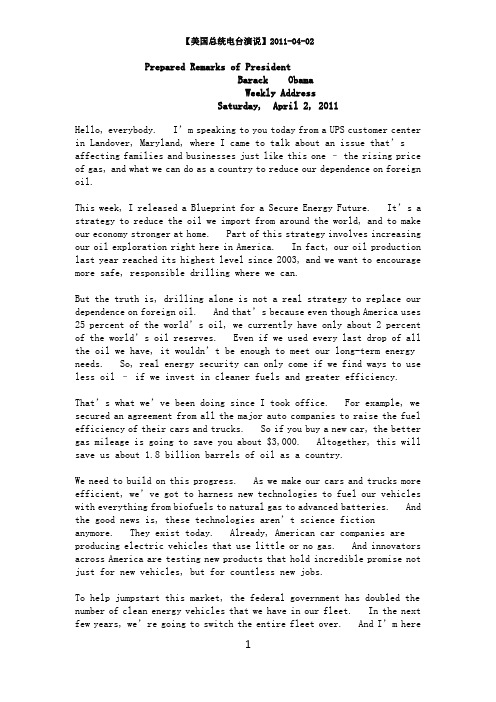
Prepared Remarks of PresidentBarack ObamaWeekly AddressSaturday, April 2, 2011Hello, everybody. I’m speaking to you today from a UPS customer center in Landover, Maryland, where I came to talk about an issue that’s affecting families and businesses just like this one –the rising price of gas, and what we can do as a country to reduce our dependence on foreign oil.This week, I released a Blueprint for a Secure Energy Future. It’s a strategy to reduce the oil we import from around the world, and to make our economy stronger at home. Part of this strategy involves increasing our oil exploration right here in America. In fact, our oil production last year reached its highest level since 2003, and we want to encourage more safe, responsible drilling where we can.But the truth is, drilling alone is not a real strategy to replace our dependence on foreign oil. And that’s because even though America uses 25 percent of the world’s oil, we currently have only about 2 percen t of the world’s oil reserves. Even if we used every last drop of all the oil we have, it wouldn’t be enough to meet our long-term energy needs. So, real energy security can only come if we find ways to use less oil – if we invest in cleaner fuels and greater efficiency.That’s what we’ve been doing since I took office. For example, we secured an agreement from all the major auto companies to raise the fuel efficiency of their cars and trucks. So if you buy a new car, the better gas mileage is going to save you about $3,000. Altogether, this will save us about 1.8 billion barrels of oil as a country.We need to build on this progress. As we make our cars and trucks more efficient, we’ve got to harness new technologies to fuel our vehicles with everything from biofuels to natural gas to advanced batteries. And the good news is, these technologies aren’t science fiction anymore. They exist today. Already, American car companies are producing electric vehicles that use little or no gas. And innovators across America are testing new products that hold incredible promise not just for new vehicles, but for countless new jobs.To help jumpstart this market, the federal government has doubled the number of clean energy vehicles that we have in our fleet. In the next few years, we’re going to switch the entire fleet over.And I’m hereat UPS because it’s not just the government getting in on the action. Companies like UPS, FedEx, AT&T, Verizon, and PepsiCo – firms with some of the largest fleets in the country – are switching to more efficient vehicles. And through our Clean Fleets Partnership, driven not by government, but by business, more companies are going to be switching to electric and alternative vehicles, too – not out of the goodness of thei r hearts, but because it’s good for their bottom lines.The goal is simple. When I was elected to this office, America imported 11 million barrels of oil a day. Through these and other steps, by a little more than a decade from now, we will have cut that by one third. And by doing so, we’re going to make our economy less vulnerable to wild swings in oil prices. We’re going to use cleaner sources of energy that don’t imperil our climate.And we’re going to spark new products and businesses all over th e country by tapping America’s greatest renewable resource: our ingenuity.We know how important that is. This week, we learned that the economy added 230,000 private sector jobs last month. That makes 1.8 million private sector jobs created in the last thirteen months. That’s a good sign. But we have to keep up the momentum, and transitioning to a clean energy economy will help us do that. It will ensure that the United States of America is home to the jobs and industries of tomorrow. That’s how we’ll win the future. And that’s how we’ll leave our children an America that is more secure and prosperous than before.Thanks, and have a great weekend.。
美国总统演讲稿经典
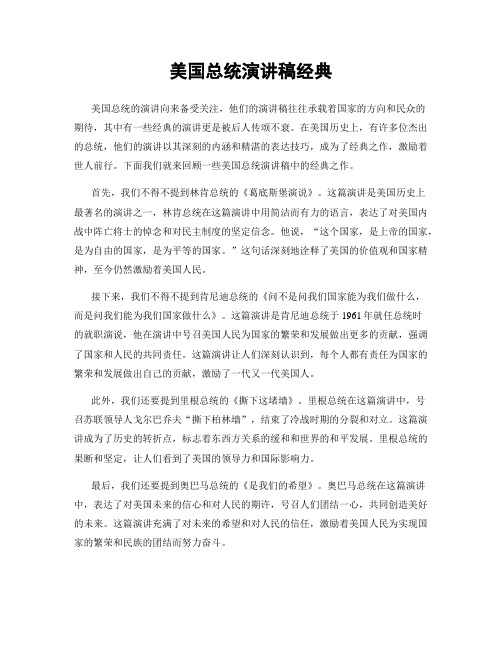
美国总统演讲稿经典美国总统的演讲向来备受关注,他们的演讲稿往往承载着国家的方向和民众的期待,其中有一些经典的演讲更是被后人传颂不衰。
在美国历史上,有许多位杰出的总统,他们的演讲以其深刻的内涵和精湛的表达技巧,成为了经典之作,激励着世人前行。
下面我们就来回顾一些美国总统演讲稿中的经典之作。
首先,我们不得不提到林肯总统的《葛底斯堡演说》。
这篇演讲是美国历史上最著名的演讲之一,林肯总统在这篇演讲中用简洁而有力的语言,表达了对美国内战中阵亡将士的悼念和对民主制度的坚定信念。
他说,“这个国家,是上帝的国家,是为自由的国家,是为平等的国家。
”这句话深刻地诠释了美国的价值观和国家精神,至今仍然激励着美国人民。
接下来,我们不得不提到肯尼迪总统的《问不是问我们国家能为我们做什么,而是问我们能为我们国家做什么》。
这篇演讲是肯尼迪总统于1961年就任总统时的就职演说,他在演讲中号召美国人民为国家的繁荣和发展做出更多的贡献,强调了国家和人民的共同责任。
这篇演讲让人们深刻认识到,每个人都有责任为国家的繁荣和发展做出自己的贡献,激励了一代又一代美国人。
此外,我们还要提到里根总统的《撕下这堵墙》。
里根总统在这篇演讲中,号召苏联领导人戈尔巴乔夫“撕下柏林墙”,结束了冷战时期的分裂和对立。
这篇演讲成为了历史的转折点,标志着东西方关系的缓和和世界的和平发展。
里根总统的果断和坚定,让人们看到了美国的领导力和国际影响力。
最后,我们还要提到奥巴马总统的《是我们的希望》。
奥巴马总统在这篇演讲中,表达了对美国未来的信心和对人民的期许,号召人们团结一心,共同创造美好的未来。
这篇演讲充满了对未来的希望和对人民的信任,激励着美国人民为实现国家的繁荣和民族的团结而努力奋斗。
总的来说,美国总统的演讲稿中充满了对国家和人民的热爱,他们用精湛的表达技巧和深刻的内涵,激励着世人前行。
这些经典的演讲,不仅是美国历史的重要组成部分,更是世界文化的宝贵遗产。
让我们铭记这些经典之作,传承这份热爱和信念,共同创造美好的未来。
美国总统罗斯福就职演讲稿
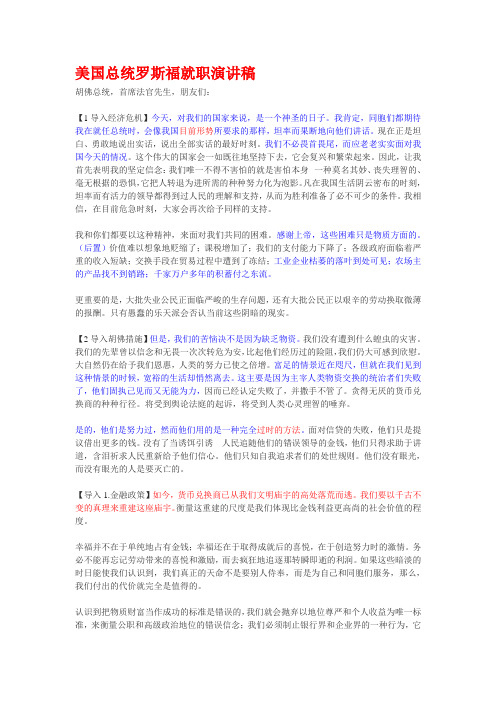
美国总统罗斯福就职演讲稿胡佛总统,首席法官先生,朋友们:【1导入经济危机】今天,对我们的国家来说,是一个神圣的日子。
我肯定,同胞们都期待我在就任总统时,会像我国目前形势所要求的那样,坦率而果断地向他们讲话。
现在正是坦白、勇敢地说出实话,说出全部实话的最好时刻。
我们不必畏首畏尾,而应老老实实面对我国今天的情况。
这个伟大的国家会一如既往地坚持下去,它会复兴和繁荣起来。
因此,让我首先表明我的坚定信念:我们唯一不得不害怕的就是害怕本身--一种莫名其妙、丧失理智的、毫无根据的恐惧,它把人转退为进所需的种种努力化为泡影。
凡在我国生活阴云密布的时刻,坦率而有活力的领导都得到过人民的理解和支持,从而为胜利准备了必不可少的条件。
我相信,在目前危急时刻,大家会再次给予同样的支持。
我和你们都要以这种精神,来面对我们共同的困难。
感谢上帝,这些困难只是物质方面的。
(后置)价值难以想象地贬缩了;课税增加了;我们的支付能力下降了;各级政府面临着严重的收入短缺;交换手段在贸易过程中遭到了冻结;工业企业枯萎的落叶到处可见;农场主的产品找不到销路;千家万户多年的积蓄付之东流。
更重要的是,大批失业公民正面临严峻的生存问题,还有大批公民正以艰辛的劳动换取微薄的报酬。
只有愚蠢的乐天派会否认当前这些阴暗的现实。
【2导入胡佛措施】但是,我们的苦恼决不是因为缺乏物资。
我们没有遭到什么蝗虫的灾害。
我们的先辈曾以信念和无畏一次次转危为安,比起他们经历过的险阻,我们仍大可感到欣慰。
大自然仍在给予我们恩惠,人类的努力已使之倍增。
富足的情景近在咫尺,但就在我们见到这种情景的时候,宽裕的生活却悄然离去。
这主要是因为主宰人类物资交换的统治者们失败了,他们固执己见而又无能为力,因而已经认定失败了,并撒手不管了。
贪得无厌的货币兑换商的种种行径。
将受到舆论法庭的起诉,将受到人类心灵理智的唾弃。
是的,他们是努力过,然而他们用的是一种完全过时的方法。
面对信贷的失败,他们只是提议借出更多的钱。
美国总统的演说
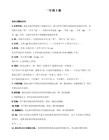
This will make a huge difference in the lives of students all across the country. Yesterday, I was with Ricorcester, Massachusetts. Every single student who graduated from Ricci’s school in the last three years went on to college. But because they didn’t meet the standards of No Child Left Behind, Ricci’s school was labeled as failing last year.
Over the last few weeks, I’ve been making the case that we need to act now on the American Jobs Act, so we can put folks back to work and start building an economy that lasts into the future.
While the goals behind No Child Left Behind were admirable, experience has taught us that the law has some serious flaws that are hurting our children instead of helping them. Teachers are being forced to teach to a test, while subjects like history and science are being squeezed out. And in order to avoid having their schools labeled as failures, some states lowered their standards in a race to the bottom.
- 1、下载文档前请自行甄别文档内容的完整性,平台不提供额外的编辑、内容补充、找答案等附加服务。
- 2、"仅部分预览"的文档,不可在线预览部分如存在完整性等问题,可反馈申请退款(可完整预览的文档不适用该条件!)。
- 3、如文档侵犯您的权益,请联系客服反馈,我们会尽快为您处理(人工客服工作时间:9:00-18:30)。
Hello, everyone. I’m speaking to you today from a Chrysler plant in Toledo, Ohio, where I just met with workers, including Jill. Jill was born and raised here. Her mother and step-father retired from this plant. And she met her husband here, and now they have two children of their own. This plant has not only been central to the economy of this town. It’s been a part of the lifeblood of this community.
The reason I came to Toledo was to congratulate Jill and her co-workers on the turnaround they helped bring about at Chrysler and throughout the auto industry. Today, each of the Big Three automakers – Chrysler, GM, and Ford – is turning a profit for the first time since 2004. Chrysler has repaid every dime and more of what it owes American taxpayers for their support during my presidency – and it repaid that money six years ahead of schedule. And this week, we reached a deal to sell our remaining stake. That means soon, Chrysler will be 100% in private hands.
Most importantly, all three American automakers are now adding shifts and creating jobs at the strongest rate since the 1990s. Chrysler has added a second shift at the Jefferson North plant in Detroit that I visited last year. GM is adding a third shift at its Hamtramck plant for the first time ever. And GM plans to hire back all of the workers they had to lay off during the recession.
That’s remarkable when you think about where we were just a couple of years ago. When I took office, we were facing the worst recession since the Great Depression – a recession that hit our auto industry particularly hard. In the year before I was President, this industry lost more than 400,000 jobs, and two great American companies, Chrysler and GM, stood on the brink of collapse.
Now, we had a few options. We could have done what a lot of folks in Washington thought we should do – nothing. But that would have made a bad recession worse and put a million people out of work. I refused to let that happen. So, I said, if GM and Chrysler were willing to take the difficult steps of restructuring and making themselves more competitive, the American people would stand by them – and we did.
But we decided to do more than rescue this industry from a crisis. We decided to help it retool for a new age, and that’s what we’re doing all across the country –we’re making sure America can out-build, out-innovate, and out-compete the rest of the world. That’s how we’ll build an economy where you can see your incomes and savings rise again, send your kids to college, and retire with dignity, security, and respect. That’s how we’ll make sure we keep that fundamental American promise –that if you work hard and act responsibly, you’ll be able to pass on a better life to your kids and grandkids.
Now, we’ve got a ways to go.Even though our economy has created more than two million private sector jobs over the past 15 months and continues to grow, we’re facing some tough headwinds. Lately, it’s high gas prices, the earthquake in Japan, and unease about the European fiscal situation. That will happen from time to time. There will be bumps on the road to recovery.
We know that. But we also know what’s happened here, at this Chrysler plant. We know that
hardworking Americans like Jill helped turn this company and this industry ar ound. That’s the American story. We’re a people who don’t give up –who do big things, who shape our own destiny. And I’m absolutely confident that if we hold on to that spirit, our best days are still ahead of us. Thanks for tuning in, and have a great weekend.。
